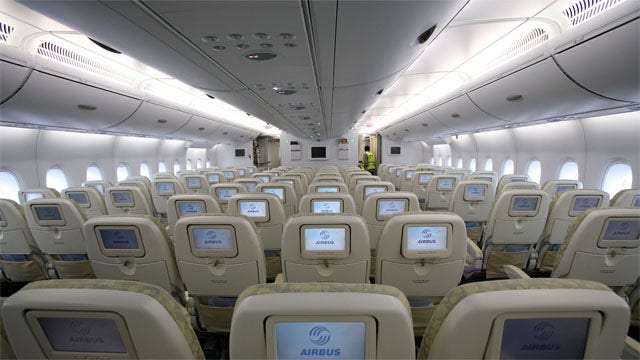New study shows bacteria can linger on airplanes for days
Could your next flight make you sick?
With the recent spread of the Middle Eastern respiratory syndrome coronavirus (MERS-Cov) to the United States via airplane travelers, it’s inevitable that summer vacationers will wonder whether the planes they travel in are serving as incubators for germs and bacteria.
“Any time you have people crowded into a situation, sometimes for a long period of time, you often wonder, ‘What is the chance of me catching this and that?’” James Barbaree, associate director for research at the Auburn University Center for Detection and Food Safety in Auburn, Alabama, told FoxNews.com.
In a study presented at the annual meeting of the American Society for Microbiology, Barbaree and his Auburn University colleague, Kiril Vaglenov, decided to analyze the survival of two common types of bacteria in airplane-like conditions: methicillin-resistant Staphylococcus aureus (MRSA) and E. coli O157:H7.
MRSA is a type of antibiotic resistant staph bacteria which can cause skin and other infections. It is estimated to kill 19,000 people every year in the United States, according to the World Health Organization. E.coli O157:H7 is most well-known for causing foodborne illnesses.
“With E.coli O157:H7, there have been a lot of foodborne illness outbreaks in the last 15 to 20 years actually and with MRSA, everybody is concerned about MRSA and MRSA is found all over the place, so these organisms are kind of common organisms to us,” Barbaree said.
The researchers tested the duration of the two pathogens on six types of materials obtained from an unnamed major airline: an armrest, plastic tray table, metal toilet button, window shade, seat pocket cloth, and leather. They exposed the items to each pathogen, and then left them in an incubator which mimicked typical airplane conditions to see how long the pathogens could survive.
Overall, MRSA survived the longest – 168 hours – on material from a seat-back pocket. E. coli O157:H7 survived longest – 96 hours – on material from an airplane armrest.
“The porous surfaces…are more protective for the bacteria – cloth, like the pocket cloth on the back of the seat, something like that has a lot of crevices where bacteria can get in,” Barbaree said. “If you compare that to a stainless steel toilet handle, the toilet handle is not porous so the survival is not as long there as in the porous surface.”
Barbaree stressed that their findings weren’t cause for alarm – MRSA has been found to linger for much longer on other surfaces, and airplane-like conditions are actually detrimental to many types of bacteria.
“The humidity is so low, around 20 percent usually, and since the humidity is so low there are other types of bacteria that would not tolerate that,” Barbaree said. “So [an airplane-like environment works] more towards minimizing different types of bacteria being able to be present rather than optimizing it.”
Barbaree said the airline industry has been very supportive of his research. Though airlines already employ high-intensity particulate air (HEPA) filters to minimize the risks of airborne pathogens spreading during a flight, they are eager to learn more about how they can further prevent the spread of bacteria on surfaces as well.
“The airlines are very interested in any way they can help to minimize any kind of risk or to add a safety procedure; they have been very cooperative in the whole thing,” Barbaree said.
He said the best way to avoid contracting an illness from a pathogen in an airplane, or anywhere, is to practice good hygiene, such as regular hand washing.
Now, Barbaree and Kiril are working on studying the longevity of tuberculosis-like bacteria in airplane conditions, as well as conducting further research into the best methods of sanitization to use in an airplane environment.
“We’re very interested in going further in disinfection procedures and the possibility of, can we incorporate anti-bacterial compounds into some of these surfaces to minimize [risk]?,” Barbaree said. “We will never be able to completely sterilize an airplane –but we’re very interested in that [research].”









































